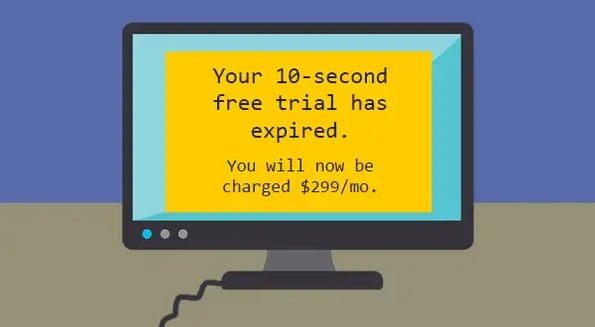If there’s no such thing as a free lunch, there sure as hell ain’t no thang as a 30-day free trial… for anything.

At least not when you look at the true costs. “Subscription creep,” an e-evil born of 1-click shopping, makes it entirely too easy to make purchases online… and keep making them.
Take my money… no, really
Whether you’re signing up to access your favorite news source or check out a service for your side hustle, you can get a free trial… in exchange for your credit or debit card number.
It’s a convenient swap if you end up liking and wanting to continue the service, but some businesses take extra steps to make it hard to cancel.
Why can’t I quit you?
It’s not you, it’s them. According to Bankrate’s 2019 online shopping survey, 59% of US adults who signed up for a free trial were later charged… even if they didn’t sign up to continue receiving the product or service.
And here’s a potentially weird complexifier: Half of survey respondents said it’s unsafe to save financial info when making purchases, and yet 64% of American cardholders said, “Yeah, OK… ” when signing up for these things.
If it sounds like people are acting against their best interest…
They are. But, they might not be entirely to blame.
Some companies resort to such online alchemy as hiding terms and conditions or using pre-checked sign-up boxes as a default setting.
Often, companies don’t send emails alerting consumers that a free trial has started or is ending, and some make up rules that make it next-to-impossible to get a refund. These fees (usually) won’t break the bank… but they’re not nothing.
According to the Better Business Bureau, customers lost an average of $186 on these complaints. And the FBI’s Internet Crime Complaint Center found that registered complaints totaled $15m+ from 2015 to 2017.

